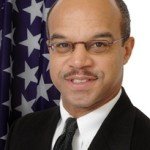Window on the West
by Mary Rupert
There’s something different about the mayoral contest this year in Kansas City, Kan. It’s because the contest was shifted from the spring to the fall this year.
While it may seem like city campaigns should be in full swing, in reality, they are just getting started.
The mayoral contest in Kansas City, Kan., is shaping up so far as a two-person race, but it may not stay that way.
On Feb. 6, incumbent Mayor Mark Holland filed for re-election, and challenger David Alvey also filed for mayor. During the past few months, there has been speculation that others are interested in the office, also.
Stopping by the election office on Thursday, Feb. 16, William Crum was told that those two were still the only candidates officially filing for mayor. However, more than a dozen information packets about filing for office have been requested from the election office. That shows some additional interest, with the possibility that others may file. The filing deadline is noon June 1, the primary is in August and the general election is in November.
In the last primary campaign, in spring 2013, five candidates sought the office. The general election was between Holland and Commissioner Ann Murguia, with Holland receiving 56 percent of the vote to Murguia’s 43 percent. Former Commissioner Nathan Barnes was in a close third place in the primary.

A frequently mentioned possibility for a mayor’s campaign this year is State Sen. David Haley, D-4th Dist. After a legislative forum on Saturday, Feb. 11, at the Main Kansas City, Kan., Public Library, Haley was asked whether he was going to run this year.
Sen. Haley said he was excited that there would be a vigorous debate, and he was listening closely to what the candidates propose to do. He indicated he would be monitoring the campaign on issues in which he was interested.
“I just want to hear a genuine commitment (from each candidate),” Sen. Haley said. He added he had a solid reputation that could only be diminished by running. However, he did not specifically say he would or would not run for the mayor’s office.
Incumbents traditionally have a large advantage in elections, mostly because they already have good name recognition. Incumbents also can make an announcement about major economic development initiatives, for example.
But the incumbent’s advantage may be smaller this year with election law changes that allow more time between the primary and general elections, formerly just around a month or so, and now about three months. The elections were moved to the fall of the year by a state law change. Instead of a primary in February and an election in March, now there will be a primary in August and a general election in November.
Alvey said last week that he expected the longer election season this year to help him, as it gives him more time to get to know the voters.
While state legislators changed the election timing this year, another issue from the last Kansas City, Kan., campaign hasn’t been changed. At the last election, the election cycle and how it affected Commissioner Nathan Barnes was an issue. In the UG’s election cycle, the 1st District candidate had to give up his UG seat in order to run for mayor, but not the 3rd District candidate. In some other cities, there is a rotation, but here, the 1st District commissioner and about half the commissioners are always running the same year as the mayor. That means a UG commissioner from one of those districts has to give up his seat to run for mayor, while commissioners from other districts do not have to risk as much.
While it may be too late to change it for this election, the issue still needs to be studied again in the future.
To reach Mary Rupert, editor, email maryr@g3f.1db.myftpupload.com.
